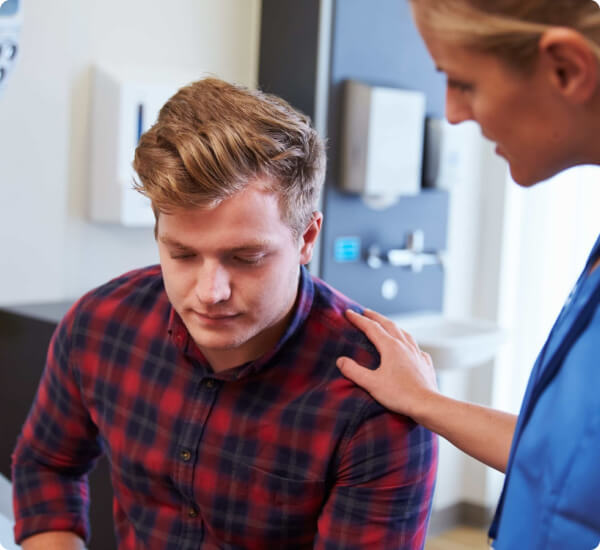LEVELS OF CARE
Detox in Connecticut
Medically assisted detox – or medical detox – is a crucial step in the recovery process from drugs or alcohol. Withdrawal from some substances can be life-threatening, and our Connecticut detox provides a safe, secure environment to safely transition into treatment.
What is Medically Assisted Detox?
When someone is dependent on a substance and stops its use suddenly, withdrawal symptoms emerge. Medically assisted detox is the process of monitoring and managing symptoms while the body rids itself of an addictive substance on which the body is physically dependent.[1]
Because some substances cause severe symptoms that can be dangerous, a medical team monitors a person’s health and comfort to ensure that they’re stable and as comfortable as possible.
Types of Drug Detox
The detox experience varies by the drug. Stimulants, such as cocaine and methamphetamine, have unpleasant withdrawal symptoms, but they’re primarily intense cravings and psychological effects like anxiety and mood swings.
However the withdrawal symptoms from some substances, such as alcohol and opioids, can be extremely unpleasant – even life threatening.[2] With these substances, medical detox is more than a recommendation. It’s considered highly dangerous to detox without medical supervision.

Medical Detox Process
Before the medical detox process begins, the clinician conducts a comprehensive evaluation to understand the nature of the drug or alcohol use disorder, any co-occurring disorders, any existing medical conditions, and the withdrawal risk.[3]
Once the evaluation is complete, you will have a customized treatment plan that will include the use of medications to ease withdrawal symptoms. Not all substances have FDA-approved medication to manage withdrawal, such as buprenorphine for opioid use disorder, but others medications may be used to manage symptoms like nausea or anxiety.
The length of detox depends on the withdrawal timeline, your medical history, and the substances involved. On average, alcohol detox takes between two days and over a week, but opioid detox can last weeks or months.
How (and Why) Drug Detoxification Works
Detoxing from drugs or alcohol can take place in different settings, depending on your needs. Detox takes place under the care of a team of professionals, which may include doctors, nurse practitioners, therapists, and other trained professionals to assist with medical care and monitoring.
Detox may take place in a hospital or inpatient rehab facility or an outpatient rehab facility, in some cases. The level of care depends on your individual care plan.

Side Effects of Medical Detox
Detoxing from drugs or alcohol can be painful, unpleasant, or even dangerous. Medical detox offers medical supervision to provide a safe and comfortable environment, but some symptoms of withdrawal are unavoidable. These include:
- Nervousness or anxiety
- Insomnia
- Nausea
- Vomiting
- Mood swings
- Sleep disturbances
- Body aches
- Poor concentration[4]

What’s the Best Way to Find a Detox Center in Connecticut?
If you or a loved one are seeking treatment for drug or alcohol addiction, detox is the first step. You can find a detox center by speaking directly to your insurance company about approved programs or asking your primary care provider. The Substance Abuse and Mental Health Services Administration (SAMHSA) also offers resources for drug detox centers.
If you want to take the next step today, contact us at Paramount Wellness Retreat to discuss your options with our care team.

What We Treat with Medically Supervised Detox
The Dangers of Quitting Drugs Cold Turkey
Quitting drugs “cold turkey,” which is when you stop using altogether without a tapering off period, can be tempting. However, with certain substances like alcohol, it’s extremely dangerous to stop use abruptly. And addiction is a complex condition that requires more than willpower.
The substances that can have the most severe withdrawal symptoms and should never be stopped cold turkey include:
- Alcohol
- Prescription sedatives and tranquilizers like benzodiazepines
- Opioids like heroin, oxycodone, and fentanyl[5]
With these drugs, it’s important to undergo medical detox to have supervision in case of serious effects, as well as to manage severe withdrawal symptoms and cravings.
Aside from the risks of adverse or even life-threatening effects, trying to quit cold turkey isn’t conducive to success. You’re at a greater risk of relapse if you’re experiencing intense withdrawal symptoms, since the drug can end the discomfort but continues the cycle of addiction.
Can You Detox from Drugs and Alcohol at Home?
In extremely limited situations, stopping a drug cold turkey and going through withdrawal at home can be an option. However, for most people – and most substances – professional detox is vital to make sure you are safe during the detox process.
If you need to detox from a substance that doesn’t have life-threatening withdrawal symptoms, such as marijuana, you may be able to go through an outpatient detox program. This setting doesn’t include intense supervision and around-the-clock monitoring, but still provides care for your withdrawal symptoms.
When you have an initial consultation with a treatment facility, they can help you determine the best course of action for the severity of your addiction, your medical history, your support system, and the substances you use.
Cost of Medically Assisted Detox
The cost of medically assisted detox depends on the detox center, your care plan, and other factors. Some insurance providers cover some or all detox expenses. Contact us today to find out if your insurance provider is in network.
Treatments and Therapies Related to Medically Supervised Detox
Detox is an important step in the addiction recovery process, but it’s not enough for treatment on its own. After completing detox, you have options for the next stage in your recovery:

Inpatient Treatment
For many people, the transition from detox into inpatient or residential treatment is ideal. This setting is highly structured and supervised, giving you the support you need to manage the psychological and emotional aspects of your addiction without the stress of everyday life.
Outpatient Treatment
Outpatient treatment can be either a step down from inpatient or the step after medical detox, depending on the level of structure and the intensity of treatment you need. Outpatient settings can vary in their intensity, but they’re ideal for balancing your recovery with the responsibilities of day-to-day life.
Aftercare
Aftercare is another option that may include an alumni program, sober living, peer support groups, or other resources. These programs are broad and include resources for career help, relapse prevention, legal guidance, and more to help you transition to everyday life.